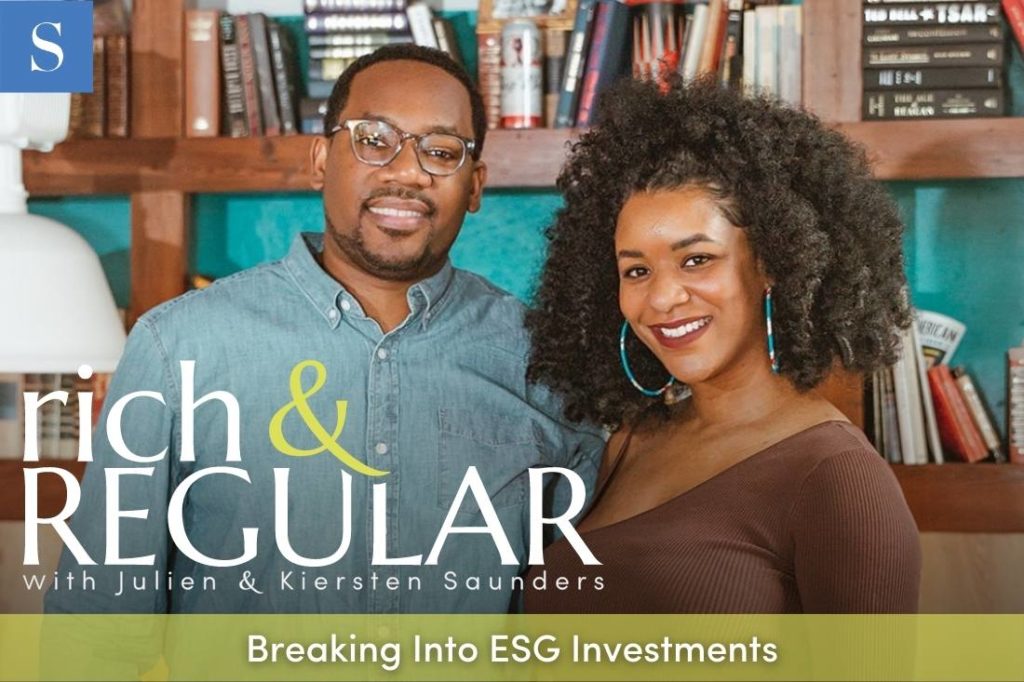Many of us know that investing is essential to achieving our dreams and securing our financial futures. When you start an investment account, you may be worried about the rate of return, fees, and tax implications, since those are the factors that affect portfolio balances most. It might not even occur to you to look closely at your investments’ societal or environmental impact.
Environmental, social, and governance (ESG) investing is a way to help change that. ESG stocks and index funds use specific criteria to help guide investors toward companies working to make a difference in the world. While it’s excellent that investing is starting to include important initiatives like the environmental and social impacts through ESG initiatives, these funds can still be challenging to understand if you’ve never encountered them before.
Rich & REGULAR with Kiersten and Julien Saunders is no longer releasing new episodes on the SUCCESS Podcast Network, but you can still listen to the full conversation below.

Julien and Kiersten Saunders break down ESG investing, and keep reading for some ways to help you research ESG funds to find one that fits your financial and social values.
What is ESG investing?
ESG investing provides non-financial data to measure a company or investment’s sustainability and its impact on society. Companies using ESG criteria may be in various sectors, like healthcare, technology, manufacturing or banking, but they are committed to furthering environmental or social causes and follow a set of outside frameworks to help them do so.
A company’s environmental policies might focus on carbon emissions from manufacturing, water or air pollution, waste management or water usage. Social factors might emphasize gender and diversity hiring, data security, sexual harassment policies, human rights and fair labor practices.
Governance seems more nebulous but usually details board and leadership diversity, political contribution transparency, lobbying, or addressing internal corruption and lawsuits.
ESG frameworks and criteria
Although companies may use an ESG structure to evaluate their business decisions, there isn’t a rule book to decide if something is sustainable or not. Companies can choose from multiple ESG frames developed by non-profits or government agencies worldwide, each with different methods, metrics, and scoring systems. Companies may even use multiple frameworks to evaluate their initiatives, depending on what their program entails—for example, a blending of environmental and social policies.
All of these criteria and options can be confusing. According to the ESG investing newsletter, For What It’s Worth (FWIW), one of the best ways to start an ESG investing journey is to familiarize yourself with the names and acronyms of some of the biggest or most popular frameworks that companies use to evaluate themselves and others.
While there is a lot of jargon and acronyms to learn when researching these investments, understanding the major frameworks and how a company scored in each can help you weigh your investment options and how a company measures up on critical issues.
How do I choose an ESG fund?
The ESG investing strategy has seen a considerable increase in popularity in recent years, and there are now multiple options to choose from at some of the biggest brokerage firms.
Find the firm for you
Once you’ve looked at some of the frameworks in use and identified companies you may want to invest in, start looking at available funds and the brokerage accounts’ rules and fees to find your own ESG stocks.
Many brokerages have ESG funds, including Vanguard and Charles Schwab, and investing can be as easy as adding the fund to your existing brokerage account and selecting a contribution amount. Some Robo-advisors, like Betterment or Wealthfront, also offer investment funds that align with ESG values or prioritize societal issues like diversity and gender equality. These can be a good option if you want to just ‘set and forget’ your investment portfolio.
Establish your ESG criteria
As you research ESG funds, spend some time thinking about the essential things you want to see in a company and develop a list to help you quickly decide if a potential investment is a good match. It’s vital to pay attention to the social aspects, but remember that you also hope to see a reasonable return on your investment.
You likely won’t (and probably shouldn’t) replace your entire portfolio with ESG investments, but establishing the criteria you’re looking for can help you evaluate other investment opportunities through a refined lens.
Build your ESG portfolio
Once you’ve researched your options and have a brokerage account, you can start to invest in companies that align with your values. Along with the frameworks above, be sure to read the company prospectus and any independent reviews of the company using a site like Morningstar to help you understand its business structure and any potential return on your money.
Be sure to consider applicable fund fees before hitting submit on your purchase request. While some funds offer higher fees on their ESG investments, finding a fund with a good return and lower fees is still possible. Compare your available options and select the fund that will work best for you.
Final thoughts
ESG investing is new to many of us, but we may have unconsciously been doing it for years. Whenever you decided to support a Black-owned business, a local mom-and-pop shop over the big box stores, or stopped using a product or sold stock when bad company behavior came to light, you were participating in social investing.
Like with any investment, it’s essential to do your research, but having the opportunity to invest your dollars in companies that reflect your values has been a long time coming and will hopefully continue far into the future.










